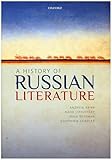A history of Russian literature / Andrew Kahn, Mark Lipovetsky, Irina Reyfman, Stephanie Sandler.
Material type: TextLanguage: English Publisher: New York, NY : Oxford University Press, 2018Description: xvi, 939 pages : illustrations (some color) ; 26 cmContent type:
TextLanguage: English Publisher: New York, NY : Oxford University Press, 2018Description: xvi, 939 pages : illustrations (some color) ; 26 cmContent type: - text
- unmediated
- volume
- 9780199663941 (hardback)
- 891.709 23
- PG 2950 K12h 2018
| Item type | Current library | Home library | Collection | Shelving location | Call number | Copy number | Status | Date due | Barcode |
|---|---|---|---|---|---|---|---|---|---|
 Libro
Libro
|
Biblioteca Juan Bosch | Biblioteca Juan Bosch | Humanidades | Humanidades (4to. Piso) | PG 2950 K12h 2018 (Browse shelf(Opens below)) | 1 | Available | 00000163016 |
Includes bibliographical references (pages 771-786) and index.
The History of Russian Literature provides a comprehensive account of Russian writing from its earliest origins in the monastic works of Kiev up to the present day, still rife with the creative experiments of post-Soviet literary life. Five chronological parts by design unfold in diachronic histories; they can be read individually but are presented as inseparable across the span of a national literature. Throughout its course, this History follows literary processes as they worked in respective periods and places, whether in monasteries, at court, in publishing houses, in the literary marketplace, or the Writers’ Union. Evolving institutional practices used to organize literature are themselves a part of the story of literature told in poetry, drama, and prose including diaries and essays. Equally prominent is the idea of writers’ agency in responding to tradition and reacting to larger forces such as church and state that shape the literary field. Coverage strikes a balance between extensive overview and in-depth thematic discussion, addressing trans-historical questions through case studies detailing the importance of texts, figures, and notions. The book does not follow the decline model often used in accounts of the nineteenth century as a change-over between ages of prose and poetry. We trace in the evolution of literature two interrelated processes: changes in subjectivities and the construction of national narratives. It is through categories of nationhood, literary politics, and literary life, forms of selfhood, and forms of expression that the intense influence of literature on a culture as a whole occurs.


There are no comments on this title.